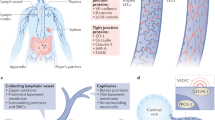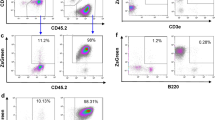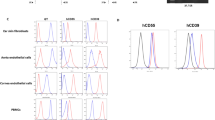Abstract
THE successful transfer of nephrotoxic nephritis (Masugi's method) in rats to essentially healthy animals of the same inbred strain by parabiosis was described earlier1,2. In these experiments, transfer of rabbit antibody from the first into the second rat was excluded by the fluorescent antibody technique3. Recently, experiments were reported in which the so-called auto-immune nephrosis was also induced by par abiotic transfer4. Furthermore, this disease has been transferred by means of lymph node cells6. Nephrotoxic nephritis was “transferred” by peripheral white blood cells of nephritic donors6. It was assumed that blood lymphocytes were the immunologically responsible cells and caused the renal lesions in the recipient. It was considered that further investigations of the transfer of circulating lymphocytes obtained from a lymphatic vessel would prove whether or not this assumption was correct.
This is a preview of subscription content, access via your institution
Access options
Subscribe to this journal
Receive 51 print issues and online access
$199.00 per year
only $3.90 per issue
Buy this article
- Purchase on Springer Link
- Instant access to full article PDF
Prices may be subject to local taxes which are calculated during checkout
Similar content being viewed by others
References
Pfeiffer, E. F., Schöffling, K., Sandritter, W., Schröder, J., Steigerwald, H., and Wolf, L., Z. ges. exp. Med., 124, 475 (1954).
Lange, K., Wachstein, M., and McPherson, S. E., Proc. Soc. Exp. Biol. and Med., 106, 13 (1961).
Pfeiffer, E. F., Ditschuneit, H., Federlin, K., Mosler, I., Ohebschalon, R., and Sandritter, W., Klin. Wschr., 38, 611 (1960).
Heymann, W., Hunter, I. L. P., Hackel, D. B., and Cuppage, F., Proc. Soc. Exp. Biol. and Med., 111, 568 (1963).
Hess, E. V., Ashworth, C. T., and Ziff, M., J. Exp. Med., 115, 421 (1962).
Pfeiffer, E. F., Müller-Ruchholtz, W., and Federlin, K., Nature, 195, 718 (1962).
Bollmann, I. L., Cain, I. G., and Grindlay, I. H., J. Lab. Clin. Med., 33, 1349 (1948).
Federlin, K., Sandritter, W., Müller-Ruchholtz, W., and Pfeiffer, E. F., Verh. Dtsch. Ges. In. Med., 69, 203 (1963).
Chase, L. M., in “Allergic” Encephalomyelitis, edit. by Kies, M. W., and Alvord, jun., E.C., 348 (Charles C. Thomas, Springfield, Illinois, 1959).
Roitt, I. M., and Doniach, D., Lancet, ii, 1027 (1958).
Freund, J., Thompson, G. E., and Lipton, M. M., J. Exp. Med., 101, 591 (1955).
Felix-Davies, D., and Waksman, B. H., Arthritis and Rheum., 4, 416 (1962).
Lawrence, S. H., in Cell-bound Antibodies, edit. by Amos, B., and Koprowski, H. (Wistar Institute Press, 1963).
Author information
Authors and Affiliations
Rights and permissions
About this article
Cite this article
FEDERLIN, K., LEINWEBER, W. & PFEIFFER, E. Transfer of Experimental Nephritis in Rats by means of Lymphatic Duct Lymphocytes. Nature 211, 1199–1200 (1966). https://doi.org/10.1038/2111199b0
Issue Date:
DOI: https://doi.org/10.1038/2111199b0
This article is cited by
-
Action of heterogeneic antilymphocytic serum on the development of nephrotoxic nephritis in rats
Bulletin of Experimental Biology and Medicine (1971)
Comments
By submitting a comment you agree to abide by our Terms and Community Guidelines. If you find something abusive or that does not comply with our terms or guidelines please flag it as inappropriate.



